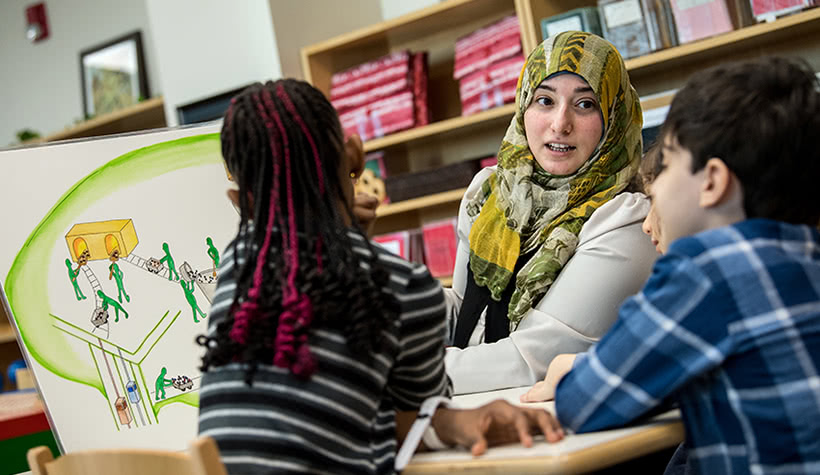Diverse Community of Learners
When students enroll in Loyola’s undergraduate, graduate and continuing education programs, they are welcomed into a vibrant community of faculty, staff, students, alumni, and community partners. We emphasize relationship-building both within our classrooms, and the communities our students serve.
Pursuing a stronger education system, together

When RaShawna Sydnor, M.A. ’12, started her journey at Loyola, she had no idea she would one day be teaching the very course that influenced her so deeply. A 2012 graduate of the Master of Arts in Curriculum and Instruction for Social Justice (CISJ) program, Sydnor is now a middle grades teacher at Green Street Academy and a lecturer within the School of Education.
Sydnor said her career path was heavily influenced by her faculty mentors and the community she built during her time at the university.
"Power, Identity, and Intersectionality was one of my first courses at Loyola, and it absolutely changed my perspective on what education could look like. It felt so brave, so transformative, and so liberating," said Sydnor. "When Stephanie Flores-Koulish, director of the CISJ, asked me to teach that class, I was honored to be leading a course that was so monumental for me as a teacher."
Following the tone set by her Loyola mentors, Sydnor is now welcoming new students to the very community that embraced her energy for educating and transforming the next generation of leaders.
Forming Genuine Connections
Both online and in-person, our community empowers students to forge genuine connections that push them to thrive academically, professionally, and personally, while imploring them to think critically about education’s past and present inequities and its current place in society.
"The close-knit relationship among faculty, students, alumni, and our neighbors provides a strong foundation and justification for my research and service," said Stephanie Flores-Koulish, Ph.D., director of the CISJ program. "When you’re here, you’re surrounded by thoughtful engaged scholars who want to make the world a better place."
"Loyola engages students by regularly and consistently challenging them to get outside their comfort zone and look at new perspectives in the community and classroom," said Elizabeth "Liz" Burton, an alumna of the Master’s in School Counseling program. "During my time at Loyola, I’ve learned and grown through opportunities like practicum, as well as frequent practice-based activities and active discussion in my weekly classes."
Collaborative Learning and Teaching
A collaborative approach to education can be found across all degrees and licenses. In fact, in many of our graduate programs, students can join a cohort where they work together through an academic program at the same pace.
According to recent MAT graduate Mike McCourt, "The other students in my cohort were amazing and made the intensity of this program a shared, instead of solitary, experience of growth and learning."
"One of the biggest goals of our cohort option is to help our candidates expand their network, so they’re in regular communication with faculty, colleagues, and students facing similar experiences," said Melissa Mulieri, director of the Master of Arts in Teaching (MAT) program. "As they grow familiar with one another, they are able to grow professionally while digging deeper into difficult topics and openly addressing challenges in our education system."
And in our online programs, Loyola’s faculty think critically about making the experience as collaborative and interactive as our in-person courses.
According to David Marcovitz, Ph.D., associate dean of the School of Education, "The secret to good online courses is not just taking what you do in person and throwing it online, but thinking seriously about how the goals and objectives of the course can be met through high-impact online teaching methods. While one might be tempted to take a bunch of lectures and record them, that wouldn’t be powerful student-centered learning. We think carefully about how to design small-group discussions, project and problem-based learning, and other creative pedagogies to take advantage of the power of online learning."
A Lifelong Network
Whether in the classroom, online, or a hybrid, once you join the Loyola School of Education community, you become part of a highly active and influential network more than 20,000 educators strong that you can count on for lifelong learning and collaboration.
"What I enjoy most about participating in the Loyola community is that I get to see what my fellow alumni are up to in their classrooms," said Eleanore Ryan, ‘19, B.A. in Elementary Education. "I love getting feedback from them because I know that a lot of them teach in similar types of schools as I do and have gone through similar experiences as me. Their wisdom has definitely helped me become a better teacher!"
Ready to learn more?
Contact us at education@loyola.edu or 410-617-2990.Attend an Information Session